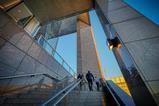Starting a PhD is a challenging task to navigate – motivation, drive and determination are all essential criteria for a new candidate. Now, for good measure, throw a pandemic into the mix and the pressure can test the nerves of even the most dedicated of students.
Since before I started my undergraduate degree, I had big dreams of becoming ‘Dr Trivett’, so I eagerly began to apply for PhD programmes in early 2020. As COVID-19 was making its way around the world, and working from home became the new norm, my PhD interview was online. A few days afterwards, I was offered a PhD at the University of Liverpool. There were a lot of unknowns surrounding PhDs starting in the autumn of that year, with many current students having to adapt quickly to an online presence overnight, but I was eager to begin a project I was passionate about, developing my research skills as a PhD candidate.
Fast forward to October of that year, and I had moved to Liverpool (a city I now call home). With the pandemic still in full force, the hurdles I would have to overcome were obvious. As a very sociable person, I love nothing more than to be sat in the office having a chat with those around me. So undoubtedly one of the hardest things I found during the start of my PhD was working from home. Although I had successfully worked from home for the end of my degree, finishing my dissertation, second semester modules and exams, working from home on a new project proved challenging. Starting a PhD at any time can be isolating as you begin to navigate a new path in your education and career, but the lack of those in a similar position around you seemed to have huge implication: there is nobody to validate how you are feeling through shared experience. Overcoming loneliness during the work-from-home era, I began to learn the importance of staying connected online. We have all experienced our fair share of ‘Zoom fatigue’ but being able to chat to peers in regular virtual coffee mornings, making the most of Slack channels and connecting with people on social media created a feeling of connectivity and virtual camaraderie, confirming that you are not the only person going through these experiences.
As I mentioned previously, a PhD requires motivation and drive. During the pandemic, I found maintaining motivation to be much harder than expected. The motivation was not a constant; it came in waves. Some days, I could work with little distraction, whereas other days, more time was spent staring out the window at passers-by on their daily walks than looking at my computer screen. In the first few months of my PhD, I quickly realised the weight I was carrying on my shoulders; I was expecting lists and lists of tasks to be completed without considering the impact the pandemic may have had on me. I found that adding structure to my working day and setting boundaries for working hours improved my productivity, whilst having breaks little and often kept me focused and on task. Over time, my mentality changed towards work, rewarding myself for what had been done rather than punishing myself for things that had not been completed. Changing the way I planned my days and being realistic in what I was expecting myself to do during such uncertain times saw an improvement in my work and what I was able to achieve during my first year.
The path of a PhD is very fluid and often how your PhD plan starts isn’t always how you submit your thesis. The direction of a PhD often changes course as new data or new papers emerge with exciting developments in that particular field. However, when COVID-19 hit, many PhD students had unexpected changes to their project when restrictions on lab access, reagent and materials and being able to attend placements was hindered. During my first year, I found it important to adapt and modify my PhD so that the project was robust, accounting for the consequences of a pandemic. Being able to have the flexibility in my work ensured I was able to work efficiently, working with the pandemic rather than against it. When there were times I was twiddling my thumbs due to accessibility or lulls in workload, I was able to explore new avenues of research and enrol on postgraduate courses to learn new skills that would be relevant to my PhD. Although at times I found the uncertainty of the project path a little frustrating, the effects of the pandemic on my PhD overall were positive, creating a multidisciplinary PhD, which incorporated wet lab, bioinformatics and qualitative enquiries, diversifying the skills I could acquire through my PhD.
Looking back at my PhD journey so far, I can certainly say it has been a bumpy one! But the experiences I have had starting a PhD in a pandemic have not only shaped my project but also my character, as I am learning to be more resilient, self-disciplined, adaptable and patient. There has been a myriad of lessons learnt from the pandemic and that in itself has caused changes in the way in which PhDs are completed, such as greater flexibility for hybrid working and conferences. Soon to hit the halfway mark in my PhD, I am excited to see where the next part of my journey takes me. What new lessons and skills will I learn? How will my character evolve? What new challenges will I face.












No comments yet